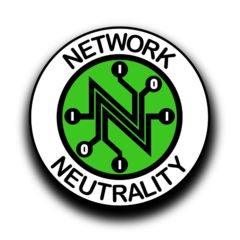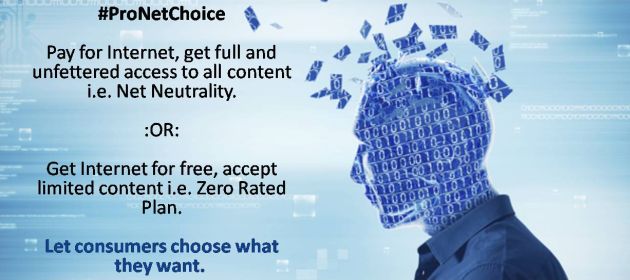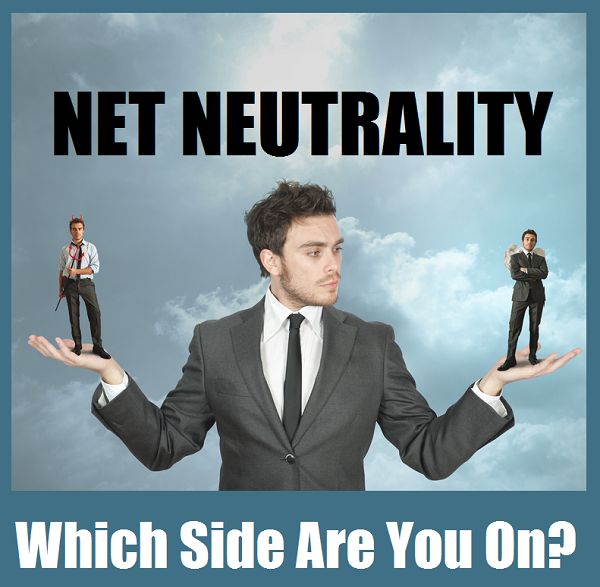 Enough water has flown under the bridge since I wrote Goodbye #NetNeutrality Hello #ProNetChoice. During this period, I got a chance to deep dive into the principle of “zero rating” and examine whether it can coexist with Net Neutrality.
Enough water has flown under the bridge since I wrote Goodbye #NetNeutrality Hello #ProNetChoice. During this period, I got a chance to deep dive into the principle of “zero rating” and examine whether it can coexist with Net Neutrality.
In this post, I’m pleased to say that #ProNetChoice, the concept introduced in the previous post, can help you have your Net Neutrality cake and eat it too.
But before that, a word about zero rating.
In the Indian context, a Zero Rated Plan (“ZRP” from here on) provides limited access to the Internet for free. “Limited access” means access only to the websites of companies (“ZRP Participants”) who pay the ISP / MNO for the bandwidth used by ZRP Users to access their websites. Facebook’s Free Basics / Internet.org is a good example of ZRP.
(There could be other flavors of ZRP. In Belgium and USA, for example, zero rating allows access to some services without using up the consumer’s data quota).
ZRP is meant primarily to spread the Internet to people who can’t afford a conventional Paid Plan (PP) where consumers pay for Internet and enjoy full and unfettered access to all legal content.
To clear any confusion – and there’s bound to be a lot of it in case you’ve been following all the chatter on this topic – ZRP is not the only plan. All ISPs / MNOs, including the ones that have announced a ZRP, continue to offer Paid Plans, with consumers being free to move between ZRP and PP and vice versa. So, it’s not a question of limited content versus full content but free versus paid Internet access.
Supporters of Net Neutrality (“#NetNeutralistas” from here on) have been lashing out at ZRP on various grounds. IMO, most of them lack merit and some of them are downright ludicrous. Let’s take some of their major objections to ZRP.
#1. ZRP Violates Net Neutrality
No, ZRP doesn’t contravene the provisions of Net Neutrality. The US FCC has enshrined Net Neutrality as law but permits ZRP. See T-Mobile Lets You Listen to Apple Music Without Paying for Data for an example of T-Mobile’s ZRP.
#2. ZRP Projects Limited View of Internet
#NetNeutralistas claim that the have-nots who will sign up for ZRP will grow up with a limited view of the Internet. That’s true because ZRP Users can only access content of ZRP Participants like Facebook.
However, without ZRP, the have-nots who don’t have a Paid Plan have NO view of the Internet.
Like in many things in life, “something is better than nothing” and, IMHO, limited access via ZRP is better than no access because of lack of PP.
My opinion apart, it should be up to the have-nots to decide. More on that in a bit.
#3. ZRP Starves Bandwidth for Paid Plans
In Net Neutrality: The Culprit is the Government, the author says, “In a paid package, there should be no faster lanes, but in a free package, there are no rules since it is free.”
But soon after agreeing that Zero Rated Plans should be allowed, the author launches into a fit of hypotheticals. He claims that since an ISP / MNO earns 4X money per GB from a ZRP Participant than from a Paid Plan Subscriber (“PPS”), they’d divert all their bandwidth to ZRP, thus throttling their PPs.
This is a highly simplistic logic. If it were to be applied to, say, the Tata Group, India’s largest conglomerate, the Group would divert all its resources to Tata Housing Limited (which sells homes) and starve Tata Chemicals Limited (which sells salt) since it makes INR 10 million or more per customer of Tata Housing and only INR 100 or less per customer of Tata Chemicals. Since the Tata Group doesn’t do any such thing, this line of reasoning is preposterous. And totally betrays ignorance of the way a company prioritizes resources among its various lines of businesses, which, in the case of bandwidth allocation by an ISP / MNO, depends on many other factors like
- Relative count of ZRP Participants versus “ZRP Holdouts” i.e. content providers that don’t participate in ZRPs, whether on principle or lack of money or both
- Relative traffic attracted by ZRP Participants versus ZRP Holdouts
- Current rates, prices and revenues from paid plans.
So, prima facie, there’s no justification to the FUD that ISPs / MNOs will starve bandwidth for their Paid Plans because of their ZRPs. If and when they do that in future, the regulator can always rap their knuckles at that time. It’s too premature to ban ZRPs now because of that.
#4. ZRP Holdouts Will Die
#NetNeutralistas argue that ZRP Holdouts will lose their traffic because people who access their content today would opt for ZRP – not because they can’t afford to pay for Internet but because they’d be tempted by free access – and lose access to their websites.
This is an overly cynical worldview of consumer behavior and a gross underestimation of their own value proposition. In any case, it’s not a good enough reason for denying Internet access – however limited – to hundreds of millions of Internet-deprived people.
In any democracy, the government has to regulate in the interest of the majority of citizens, not just a bunch of startup entrepreneurs who holdout from ZRP.
#5. ZRP Stifles Innovation
A corollary of #4 is that startups are doing a lot of innovative stuff and, when they get locked out of ZRP, innovation would be stifled.
This is a very self-serving view: It’s always possible that the hundreds of millions of new Internet users could spark off a lot of new innovation that’s missing today when the have-nots don’t have access to the Internet.
The government can’t write regulations on the basis of the assumption that innovation is the sole preserve of ZRP Holdouts.
Frankly, all these and more grounds for opposition of ZRPs rely on hypotheticals. Even if some of the predictions come true, startups should leverage them to learn how to disruption-proof themselves, which is not such a bad thing when they threaten to disrupt everyone else!
In a recent town hall at IIT Delhi, Mark Zuckerberg, CEO of Facebook, noted that #NetNeutralistas are going too far in claiming that Zero Rated Plans violated Net Neutrality. Not just me but even some people arguing against ZRP, like the author of the article cited in #3 above, would agree.
Given the above background, I reiterate my preference for #ProNetChoice:
Pay for Internet, get full and unfettered access to all content i.e. Net Neutrality OR Get Internet for free, accept limited content i.e. Zero Rated Plan. Let consumers choose what they want.
(Let me hasten to add that I’m not in favor of any other options e.g. Pay 25% of price of a Paid Plan and get access to 25% of content.)
But that’s only me.
This debate is rife with the “haves” unilaterally deciding what kind of Internet access the “have nots” should or should not have.
IMHO, it’s time to throw open the debate to the “have nots”.
The question of whether to allow ZRP or not should be put out to referendum (like all issues affecting the common man are in Switzerland). This poll must be conducted offline since, as Zuckerberg points out, the have-nots can’t participate in an online poll.
As for the cost of the referendum, it’s only fair that #NetNeutralists should bear it: If they hadn’t poked their nose, service providers would have expanded their zero rated plans, consumers would have accepted or rejected the limited access, and there would be no need for this referendum.

